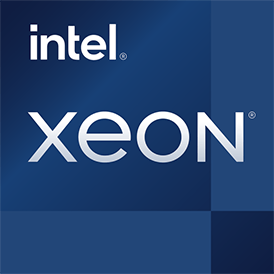
Intel Xeon E3-1225 v5 Benchmark, Test and specs
Last updated:
The Intel Xeon E3-1225 v5 is a 4 core processor. It can handle 4 threads simultaneously and was introduced in Q4/2015. The Intel Xeon E3-1225 v5 is based on the 5. generation of the Intel Xeon E3 series and requires a mainboard with the socket LGA 1151. The Intel Xeon E3-1225 v5 scores 1,068 points with one CPU core in the Geekbench 5 benchmark. When using all CPU cores, the result is 3,528 points.

| Name: | Intel Xeon E3-1225 v5 |
|---|---|
| Family: | Intel Xeon E3 (43) |
| CPU group: | Intel Xeon E3 v5 (17) |
| Architecture: | Skylake S |
| Segment: | Desktop / Server |
| Generation: | 5 |
| Predecessor: | -- |
| Successor: | -- |
CPU Cores and Base Frequency
The 4 CPU cores of the Intel Xeon E3-1225 v5 clock with 3.30 GHz (3.70 GHz). The number of CPU cores and the clock frequency of the processor are largely responsible for the overall performance.
| CPU Cores / Threads: | 4 / 4 |
|---|---|
| Core architecture: | normal |
| Cores: | 4x |
| Hyperthreading / SMT: | No |
|---|---|
| Overclocking: | No |
| Frequency: | 3.30 GHz |
| Turbo Frequency (1 Core): | 3.70 GHz |
| Turbo Frequency (4 Cores): | 3.50 GHz |
Internal Graphics
With the Intel HD Graphics P530, the Intel Xeon E3-1225 v5 has an build in graphic solution. It has 24 SM processors, which have a total of 192 texture shaders. The iGPU not only enables games, but also significantly accelerates video playback.
| GPU name: | Intel HD Graphics P530 |
|---|---|
| GPU frequency: | 0.35 GHz |
| GPU (Turbo): | 1.20 GHz |
| Compute units: | 24 |
| Shader: | 192 |
| Hardware Raytracing: | No |
| Release date: | Q3/2015 |
| Max. displays: | 3 |
|---|---|
| Generation: | 9 |
| Direct X: | 12 |
| Technology: | 14 nm |
| Max. GPU Memory: | 32 GB |
| Frame Generation: | No |
Hardware codec support
Processors that have an integrated graphics can play videos faster and more efficiently. This can have a positive effect on the battery life of notebooks, for example.
| h265 / HEVC (8 bit): | Decode / Encode |
|---|---|
| h265 / HEVC (10 bit): | No |
| h264: | Decode / Encode |
| VP8: | Decode / Encode |
| VP9: | No |
| AV1: | No |
|---|---|
| AVC: | Decode / Encode |
| VC-1: | Decode |
| JPEG: | Decode / Encode |
Memory & PCIeThe Intel Xeon E3-1225 v5 supports up to 64 GB memory in up to 2 (Dual Channel) memory channels. This results in a maximum memory bandwidth of 34.1 GB/s. |
|
| Memory type: | Memory bandwidth: |
|---|---|
| DDR4-2133 | 34.1 GB/s |
| Max. Memory: | 64 GB |
| Memory channels: | 2 (Dual Channel) |
| ECC: | Yes |
| PCIe: | 3.0 x 16 |
| PCIe Bandwidth: | 15.8 GB/s |
Thermal ManagementWith the TDP, the processor manufacturer specifies the cooling solution required for the processor. The Intel Xeon E3-1225 v5 has a TDP of 80 W. |
|
|---|---|
| TDP (PL1 / PBP): | 80 W |
| TDP (PL2): | -- |
| TDP up: | -- |
| TDP down: | -- |
| Tjunction max.: | -- |
Technical details
The Intel Xeon E3-1225 v5 has a 8.00 MB large cache. The processor is manufactured in 14 nm. Modern production increases the efficiency of the processor.
| Technology: | 14 nm |
|---|---|
| Chip design: | Monolithic |
| Socket: | LGA 1151 |
| L2-Cache: | -- |
| L3-Cache: | 8.00 MB |
| AES-NI: | Yes |
| Operating systems: | Windows 10, Linux |
| Virtualization: | VT-x, VT-x EPT, VT-d |
|---|---|
| Instruction set (ISA): | x86-64 (64 bit) |
| ISA extensions: | SSE4.1, SSE4.2, AVX2 |
| Release date: | Q4/2015 |
| Release price: | -- |
| Part Number: | -- |
| Documents: | Technical data sheet |
Rate this processor
Benchmark results

The benchmark results for the Intel Xeon E3-1225 v5 have been carefully checked by us. We only publish benchmark results that have been created by us or that have been submitted by a visitor and then checked by a team member. All results are based on and fullfill our benchmark guidelines.
Geekbench 5, 64bit (Single-Core)
Geekbench 5 is a cross plattform benchmark that heavily uses the systems memory. A fast memory will push the result a lot. The single-core test only uses one CPU core, the amount of cores or hyperthreading ability doesn't count.

|
Intel Core i3-9100
4C 4T @ 4.20 GHz |
||

|
Intel Core i7-8650U
4C 8T @ 4.20 GHz |
||

|
Intel Xeon E3-1225 v6
4C 4T @ 3.70 GHz |
||
|
|
Intel Xeon E3-1225 v5
4C 4T @ 3.70 GHz |
||

|
Google Tensor G2
8C 8T @ 2.85 GHz |
||

|
Intel Core i5-10600T
6C 12T @ 4.00 GHz |
||

|
Intel Core i5-10210U
4C 8T @ 4.20 GHz |
||
Geekbench 5, 64bit (Multi-Core)
Geekbench 5 is a cross plattform benchmark that heavily uses the systems memory. A fast memory will push the result a lot. The multi-core test involves all CPU cores and taks a big advantage of hyperthreading.

|
Intel Core i7-4940MX
4C 8T @ 3.90 GHz |
||

|
Intel Core i5-8400H
4C 8T @ 3.70 GHz |
||

|
Intel Xeon W-2104
4C 4T @ 3.20 GHz |
||
|
|
Intel Xeon E3-1225 v5
4C 4T @ 3.50 GHz |
||

|
Qualcomm Snapdragon 888+
8C 8T @ 3.00 GHz |
||

|
Intel Xeon E5-1620 v2
4C 8T @ 3.90 GHz |
||

|
AMD Ryzen Embedded V1807B
4C 8T @ 3.35 GHz |
||
Geekbench 6 (Single-Core)
Geekbench 6 is a benchmark for modern computers, notebooks and smartphones. What is new is an optimized utilization of newer CPU architectures, e.g. based on the big.LITTLE concept and combining CPU cores of different sizes. The single-core benchmark only evaluates the performance of the fastest CPU core, the number of CPU cores in a processor is irrelevant here.

|
Intel Core i5-10200H
4C 8T @ 4.10 GHz |
||

|
Intel Core i3-10305T
4C 8T @ 4.00 GHz |
||

|
Intel Core i7-8559U
4C 8T @ 4.50 GHz |
||
|
|
Intel Xeon E3-1225 v5
4C 4T @ 3.70 GHz |
||

|
Intel Core i7-4790K
4C 8T @ 4.40 GHz |
||

|
Intel Core i3-9300T
4C 4T @ 3.80 GHz |
||

|
Intel Xeon E3-1230 v6
4C 8T @ 3.90 GHz |
||
Geekbench 6 (Multi-Core)
Geekbench 6 is a benchmark for modern computers, notebooks and smartphones. What is new is an optimized utilization of newer CPU architectures, e.g. based on the big.LITTLE concept and combining CPU cores of different sizes. The multi-core benchmark evaluates the performance of all of the processor's CPU cores. Virtual thread improvements such as AMD SMT or Intel's Hyper-Threading have a positive impact on the benchmark result.

|
Intel Core i3-9300T
4C 4T @ 3.40 GHz |
||

|
Intel Xeon E-2124G
4C 4T @ 3.60 GHz |
||

|
Intel Core i3-1305U
5C 6T @ 1.60 GHz |
||
|
|
Intel Xeon E3-1225 v5
4C 4T @ 3.50 GHz |
||

|
Intel Xeon E3-1245 v3
4C 8T @ 3.80 GHz |
||

|
Intel Xeon Bronze 3206R
8C 8T @ 1.90 GHz |
||

|
Intel Core i7-4930K
6C 12T @ 3.60 GHz |
||
iGPU - FP32 Performance (Single-precision GFLOPS)
The theoretical computing performance of the internal graphics unit of the processor with simple accuracy (32 bit) in GFLOPS. GFLOPS indicates how many billion floating point operations the iGPU can perform per second.

|
Intel Core i7-8086K
Intel UHD Graphics 630 @ 1.20 GHz |
||

|
Intel Core i7-8700K
Intel UHD Graphics 630 @ 1.20 GHz |
||

|
Intel Core i7-9700K
Intel UHD Graphics 630 @ 1.20 GHz |
||
|
|
Intel Xeon E3-1225 v5
Intel HD Graphics P530 @ 1.20 GHz |
||

|
Intel Processor N97
Intel UHD Graphics 24 EUs (Alder Lake) @ 1.20 GHz |
||

|
Intel Xeon W-1290TE
Intel UHD Graphics P630 @ 1.20 GHz |
||

|
Intel Xeon W-1270TE
Intel UHD Graphics P630 @ 1.20 GHz |
||
Estimated results for PassMark CPU Mark
Some of the CPUs listed below have been benchmarked by CPU-monkey. However the majority of CPUs have not been tested and the results have been estimated by a CPU-monkey’s secret proprietary formula. As such they do not accurately reflect the actual Passmark CPU mark values and are not endorsed by PassMark Software Pty Ltd.

|
AMD FX-8350
8C 8T @ 4.10 GHz |
||

|
Intel Core i5-1030NG7
4C 8T @ 3.20 GHz |
||

|
Intel Core i7-8550U
4C 8T @ 2.40 GHz |
||
|
|
Intel Xeon E3-1225 v5
4C 4T @ 3.50 GHz |
||

|
Intel Core i5-7600T
4C 4T @ 3.50 GHz |
||

|
Intel Core i7-5750HQ
4C 8T @ 3.10 GHz |
||

|
Intel Core i7-3840QM
4C 8T @ 2.80 GHz |
||
Blender 2.81 (bmw27)
Blender is a free 3D graphics software for rendering (creating) 3D bodies, which can also be textured and animated in the software. The Blender benchmark creates predefined scenes and measures the time (s) required for the entire scene. The shorter the time required, the better. We selected bmw27 as the benchmark scene.

|
Intel Core i5-4670K
4C 4T @ 3.60 GHz |
||

|
Intel Core i7-3770K
4C 8T @ 3.90 GHz |
||

|
Intel Core i7-3770
4C 8T @ 3.90 GHz |
||
|
|
Intel Xeon E3-1225 v5
4C 4T @ 3.50 GHz |
||

|
Intel Core i5-7400
4C 4T @ 3.30 GHz |
||

|
Intel Core i5-4690
4C 4T @ 3.70 GHz |
||

|
AMD FX-9590
8C 8T @ 5.00 GHz |
||
Cinebench R15 (Single-Core)
Cinebench R15 is the successor of Cinebench 11.5 and is also based on the Cinema 4 Suite. Cinema 4 is a worldwide used software to create 3D forms. The single-core test only uses one CPU core, the amount of cores or hyperthreading ability doesn't count.

|
Intel Core i3-6300
2C 4T @ 3.80 GHz |
||

|
Intel Core i5-6685R
4C 4T @ 3.80 GHz |
||

|
Intel Core i5-8600T
6C 6T @ 3.70 GHz |
||
|
|
Intel Xeon E3-1225 v5
4C 4T @ 3.70 GHz |
||

|
AMD Ryzen 5 PRO 2400G
4C 8T @ 3.90 GHz |
||

|
Intel Core i5-9500T
6C 6T @ 3.70 GHz |
||

|
AMD Ryzen 5 2400G
4C 8T @ 3.90 GHz |
||
Cinebench R15 (Multi-Core)
Cinebench R15 is the successor of Cinebench 11.5 and is also based on the Cinema 4 Suite. Cinema 4 is a worldwide used software to create 3D forms. The multi-core test involves all CPU cores and taks a big advantage of hyperthreading.

|
Intel Core i5-5675C
4C 4T @ 3.30 GHz |
||

|
Intel Core i5-5675R
4C 4T @ 3.30 GHz |
||

|
Intel Core i5-8350U
4C 8T @ 2.40 GHz |
||
|
|
Intel Xeon E3-1225 v5
4C 4T @ 3.50 GHz |
||

|
Intel Core i7-4701EQ
4C 8T @ 3.00 GHz |
||

|
Intel Core i7-4700EQ
4C 8T @ 3.00 GHz |
||

|
Intel Core i7-4700MQ
4C 8T @ 3.00 GHz |
||
Benchmarks

Geekbench 5 (SC)
2,488 entries
2,488 entries

Geekbench 5 (MC)
2,461 entries
2,461 entries

Geekbench 6 (SC)
1,754 entries
1,754 entries

Geekbench 6 (MC)
1,702 entries
1,702 entries

FP32 SP (iGPU)
2,026 entries
2,026 entries

PassMark CPU-Mark
2,391 entries
2,391 entries

Blender 2.81 (bmw27)
190 entries
190 entries

Cinebench R15 (SC)
1,106 entries
1,106 entries

Cinebench R15 (MC)
1,101 entries
1,101 entries

Geekbench 3 (SC)
942 entries
942 entries

Geekbench 3 (MC)
938 entries
938 entries

Cinebench R11.5 (SC)
825 entries
825 entries

Cinebench R11.5 (MC)
836 entries
836 entries

Cinebench R11.5 iGPU
383 entries
383 entries
Popular comparisons
back to index




